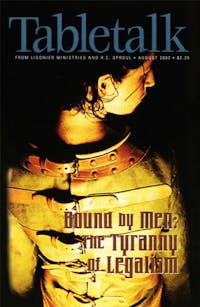
Request your free, three-month trial to Tabletalk magazine. You’ll receive the print issue monthly and gain immediate digital access to decades of archives. This trial is risk-free. No credit card required.
Try Tabletalk NowAlready receive Tabletalk magazine every month?
Verify your email address to gain unlimited access.
Although most have heard of Martin Luther’s “Ninety-five Theses,” very few are familiar with the contents. Appropriately, the substance of Luther’s first thesis conveys a charge of repentance: “When our Lord and Master Jesus Christ said to repent, He willed that the whole life of a believer should be one of repentance.” This admonition is pertinent not merely to papists of past centuries, but it is indeed a message that should be heeded by each of us.
To compartmentalize various aspects of our faith seems to be the disguised norm. However, if we are to live boldly as Christians amid a post-Christian culture, we must recognize that grace and repentance cannot be disjointed at any point or upon any condition. In Transforming Grace, Jerry Bridges calls us to recognize the pertinence of grace in all of faith and life. He observes: “When we think of grace, we almost always think of being saved by grace. . . Even Christian literature available on the subject of grace seems to deal almost exclusively with salvation. But the Bible teaches we are not only saved by grace, but we also live by grace every day of our lives” (p. 11).
One of Bridges’ theses focuses upon a common pattern of thought within the church. Addressing the manner in which people understand grace, Bridges observes that many are running on a “performance treadmill.” He explains that an unnecessary distinction has been made concerning the role of God’s grace in justification and sanctification. While all Christians understand that justification is a gracious declaratory act whereby God immediately imputes the righteousness of Christ upon those whom He has effectually called, very few recognize that the grace of God is fundamental to every aspect of the process of sanctification.
Bridges helps to interpret various biblical passages that define the life-transforming work of God’s grace, and he offers helpful insights that demonstrate grace upon grace in all of faith and life.
